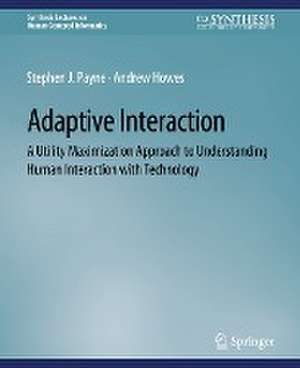Adaptive Interaction: A Utility Maximization Approach to Understanding Human Interaction with Technology: Synthesis Lectures on Human-Centered Informatics
Autor Stephen J. Payne, Andrew Howesen Limba Engleză Paperback – 20 mar 2013
Din seria Synthesis Lectures on Human-Centered Informatics
- 20%
 Preț: 166.09 lei
Preț: 166.09 lei - 20%
 Preț: 136.65 lei
Preț: 136.65 lei - 20%
 Preț: 140.75 lei
Preț: 140.75 lei - 20%
 Preț: 160.87 lei
Preț: 160.87 lei -
 Preț: 303.06 lei
Preț: 303.06 lei - 20%
 Preț: 289.49 lei
Preț: 289.49 lei - 20%
 Preț: 301.96 lei
Preț: 301.96 lei - 20%
 Preț: 353.93 lei
Preț: 353.93 lei - 20%
 Preț: 178.13 lei
Preț: 178.13 lei - 20%
 Preț: 352.89 lei
Preț: 352.89 lei - 20%
 Preț: 481.31 lei
Preț: 481.31 lei - 20%
 Preț: 332.71 lei
Preț: 332.71 lei - 20%
 Preț: 297.66 lei
Preț: 297.66 lei - 20%
 Preț: 176.97 lei
Preț: 176.97 lei - 20%
 Preț: 134.97 lei
Preț: 134.97 lei - 20%
 Preț: 270.19 lei
Preț: 270.19 lei - 20%
 Preț: 225.67 lei
Preț: 225.67 lei - 20%
 Preț: 165.90 lei
Preț: 165.90 lei - 20%
 Preț: 328.09 lei
Preț: 328.09 lei - 20%
 Preț: 224.18 lei
Preț: 224.18 lei - 20%
 Preț: 179.61 lei
Preț: 179.61 lei - 20%
 Preț: 356.56 lei
Preț: 356.56 lei - 20%
 Preț: 359.03 lei
Preț: 359.03 lei - 20%
 Preț: 167.58 lei
Preț: 167.58 lei - 20%
 Preț: 385.83 lei
Preț: 385.83 lei - 20%
 Preț: 223.67 lei
Preț: 223.67 lei - 20%
 Preț: 224.97 lei
Preț: 224.97 lei - 20%
 Preț: 193.11 lei
Preț: 193.11 lei - 20%
 Preț: 157.28 lei
Preț: 157.28 lei - 20%
 Preț: 304.30 lei
Preț: 304.30 lei - 20%
 Preț: 179.11 lei
Preț: 179.11 lei - 20%
 Preț: 173.58 lei
Preț: 173.58 lei - 20%
 Preț: 381.55 lei
Preț: 381.55 lei - 20%
 Preț: 351.94 lei
Preț: 351.94 lei - 20%
 Preț: 134.97 lei
Preț: 134.97 lei - 20%
 Preț: 388.65 lei
Preț: 388.65 lei - 20%
 Preț: 271.34 lei
Preț: 271.34 lei - 20%
 Preț: 223.01 lei
Preț: 223.01 lei - 20%
 Preț: 357.58 lei
Preț: 357.58 lei - 20%
 Preț: 300.78 lei
Preț: 300.78 lei - 20%
 Preț: 178.64 lei
Preț: 178.64 lei - 20%
 Preț: 275.79 lei
Preț: 275.79 lei - 20%
 Preț: 268.04 lei
Preț: 268.04 lei - 20%
 Preț: 301.63 lei
Preț: 301.63 lei - 20%
 Preț: 196.70 lei
Preț: 196.70 lei - 20%
 Preț: 166.59 lei
Preț: 166.59 lei
Preț: 178.13 lei
Preț vechi: 222.66 lei
-20% Nou
Puncte Express: 267
Preț estimativ în valută:
34.08€ • 35.59$ • 28.21£
34.08€ • 35.59$ • 28.21£
Carte tipărită la comandă
Livrare economică 04-18 aprilie
Preluare comenzi: 021 569.72.76
Specificații
ISBN-13: 9783031010712
ISBN-10: 303101071X
Ilustrații: XI, 99 p.
Dimensiuni: 191 x 235 mm
Greutate: 0.2 kg
Editura: Springer International Publishing
Colecția Springer
Seria Synthesis Lectures on Human-Centered Informatics
Locul publicării:Cham, Switzerland
ISBN-10: 303101071X
Ilustrații: XI, 99 p.
Dimensiuni: 191 x 235 mm
Greutate: 0.2 kg
Editura: Springer International Publishing
Colecția Springer
Seria Synthesis Lectures on Human-Centered Informatics
Locul publicării:Cham, Switzerland
Cuprins
Introduction: A Framework for Cognitive Science Research on HCI.- Background.- Signal Detection Theory and Collaborative Diagnosis.- Discretionary Task Interleaving.- Movement Planning.- Multimodal Interaction and Text Entry.- E-commerce.- Browsing Multiple Documents and Skim Reading.- Adaptively Distributing Cognition.- E-commerce Feedback.- Discussion.
Notă biografică
Stephen Payne is professor of human-centric systems in the Department of Computer Science at the University of Bath. Before moving to Bath, Payne was a Professor of Psychology in Cardiff University and (briefly) a Professor in Manchester Business School. Previously he worked at IBM T.J. Watson Research Center. Payne has worked on cognitive approaches to Human-Computer Interaction since his PhD on Task-Action Grammars, awarded in 1985.Andrew Howes is professor of Human-Computer Interaction in the School of Computer Science at the University of Birmingham, UK. He has previously held posts as Professor of Cognitive Systems at Manchester Business School, University of Manchester, and before that as Senior Lecturer in the School of Psychology at the University of Cardiff. Howes is interested in computational theories of the strategies that people choose given psychological constraints.
